The 11 weirdest stadium names
Not every stadium name is iconic - well, not for the right reasons. Nick Moore investigates the silliest stadium monikers

Tony Macaroni Arena, Livingston
There are elements of the rampant commercialisation of football that most fans grudgingly accept: gruelling pre-season tours to appease Asian-based Official Noodle Partners; dog silhouettes waddling across electronic ad billboards, distracting you from the action; and – on the whole – stadium naming rights.
The Emirates, Etihad and so forth all trip off the tongue without too much bitterness, sound vaguely “real”, and are at least funded by firms with a veneer of quality; no doubt when White Hart Lane or Stamford Bridge are replaced by “the Rolex” or “the Qatar”, it’ll seem odd, but eventually blow over.
Occasionally, though, a group of men in suits hand over a sum of money to another, more desperate group of men in suits – and the result belittles a once-proud sporting venue. The Lothian seat of Almondvale becoming the Tony Macaroni Arena this year is surely this phenomenon’s nadir: it’s a pathetic name for a chain of Italian restaurants, possibly thought up by a xenophobic six-year old, and for a football stadium is simply unbearable – just like the eye-watering Twitter puns that followed (@LiviFCOfficial: “this is all getting fusilli now!”)
Huge shame on everyone involved.
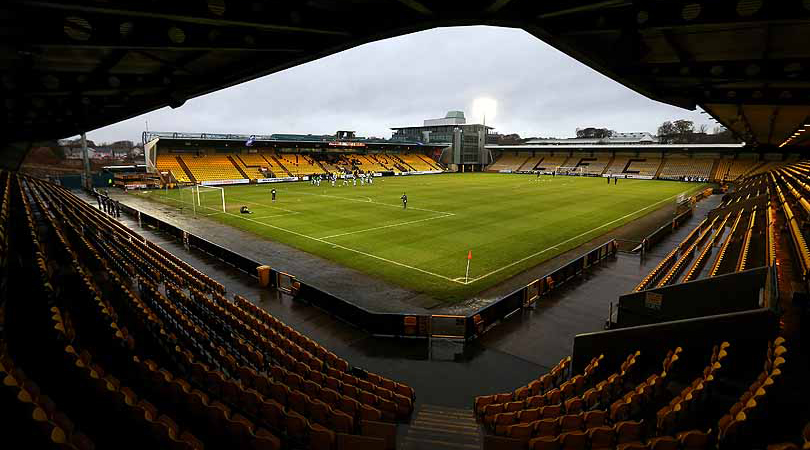
Wankdorf, Bern
There’s no Swiss equivalent of Viz, and you suspect the strait-laced natives don’t spend much time giggling about masturbation – perhaps that’s why they’re a super-rich nation with terrifyingly efficient public transport and spotlessly clean streets. Wankdorf doesn’t mean anything funny in German, but the fact that the 32,000-capacity ground is also home to BSC Young Boys has made the place irresistible to British journalists – resulting in perhaps the Sistine Chapel of immature headlines, from ESPN in 2005: “Young Boys Wankdorf erection relief”.
Get FourFourTwo Newsletter
The best features, fun and footballing quizzes, straight to your inbox every week.
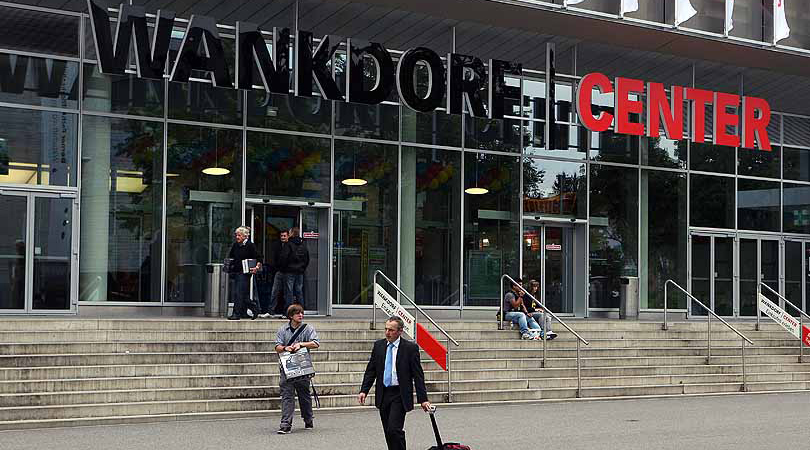
KitKat Crescent, York
There’s something inoffensively British about both KitKats – the snappable four-fingered snacking juggernaut that feels less decadent than a proper chocolate bar, but more luxurious than a plain bickie with your 10.58am cuppa – and crescents, a pleasantly curving street format.
But times change: cuddly Rowntree’s of York sold manufacturing rights to the foil-encased treat to Swiss giant Nestlé – who some people contend aren’t a very nice company – and in 2005, York’s 82-year-old Bootham Crescent was rebranded after elevenses, with their mascot becoming “Yorkie the Lion” after another of Nestle’s products, to boot.
“The dominant feeling about the renaming was faint embarrassment,” said Frank Ormston, chairman of supporters group York Minstermen. But the deal, which came to an end in 2010, did net the club £200,000. And sillier equivalents were to follow…
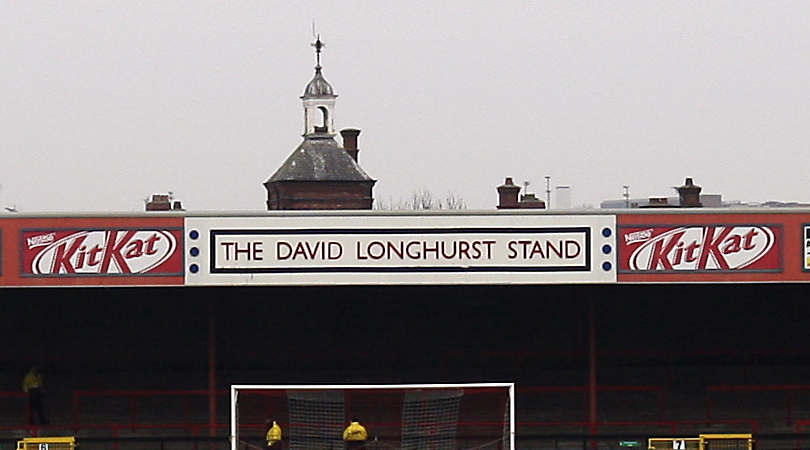
The Dripping Pan, Lewes
How did the home of Ryman Premier League side Lewes FC get its marvellous name? Well, it’s thought that local monks from the priory used to pan for salt at the base of the natural bowl carved into the lovely South Downs National Park.
From the stands, you can enjoy a fine vista: chalk cliffs and the town’s impressive Norman Castle, while FourFourTwo recently paid a visit to their latest innovation: corporate beach huts, which for £40 a head gets you a great view, cracking meal, and a mini bar stocked with the local brew, Harvey’s Blue Label. Great name, great day out.
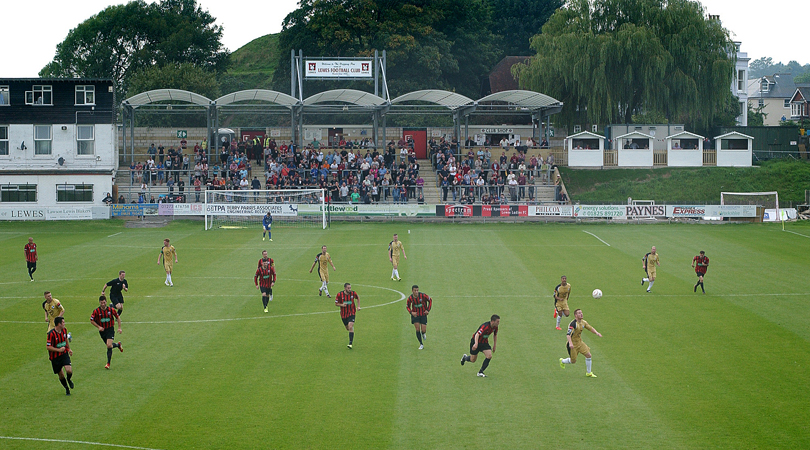
Arnold Schwarzenegger Stadium, Graz
Arnie was born in Graz, and began pumping iron as a 15-year old Austrian weed. His subsequent career projection – seven-time Mr Olympia, Conan The Barbarian, Terminator, Kindergarten Cop, Governor of California – meant that his little hometown became as puffed with pride as the Austrian Oak’s glutes.
In 1997, they decided to christen Sturm Graz’s new home after him – and it looked like he’d finally be immortalised. But in December 2005, the Guv’nor refused to use his gubernatorial powers to prevent the execution of LA gang leader Stanley “Tookie” Williams. Anti-death penalty Austrian politicians objected, the stadium lettering was removed, and Arnie returned the “ring of honour” the city had awarded him.
It’s now the boring old UPC-Arena.
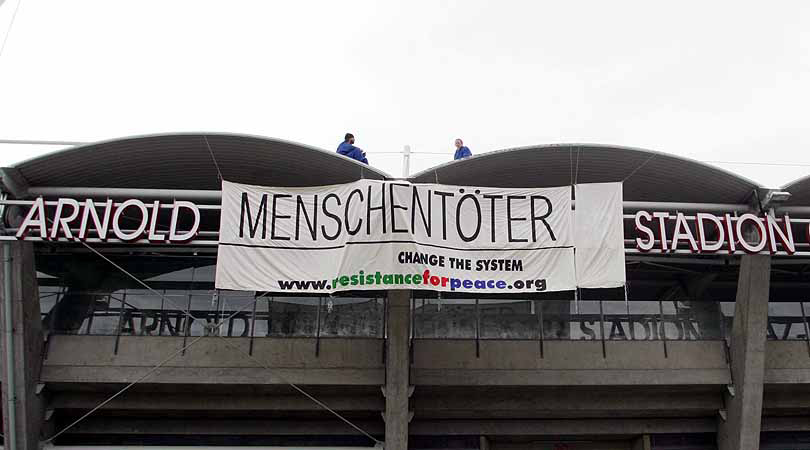
Molineux, Wolverhampton
Familiarity has bred immunity to the wonderfully enigmatic moniker of Wolves’ home. Many a young scholar of the game – trawling through an old Rothmans annual in an attempt to learn every English football stadium, perhaps – will have paused amid the boring old Victoria Grounds and Vicarage Roads, and marvelled at Molineux. What can it mean? How is it pronounced? Why does it sound vaguely French, or like the name of a high-end chocolatier?
The truth is, it’s not much different to a modern-day Madejski: Benjamin Molineux was a Midlands merchant who in the 1740s bought the land upon which the stadium would eventually be built. It nevertheless remains evocative: the day it becomes the We Buy Any Car Arena, we may as well all pack up and go home.
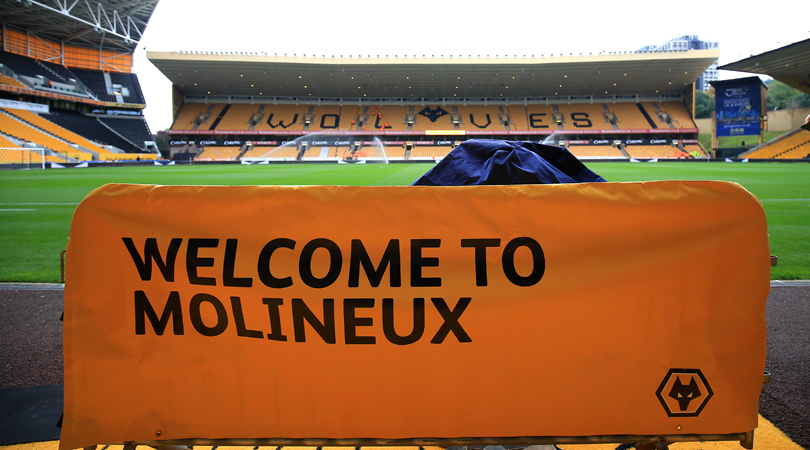
Dick’s Sporting Goods Park, Colorado
As with most things sponsorship-based, the Americans are miles ahead when it comes to stadium naming rights. Steven Gerrard swapped Anfield for the Stubhub Centre, home of LA Galaxy, Houston Dynamo trot out at the BBVA Compass Stadium, and FC Dallas once played at Pizza Hut Park (now the slightly less awful Toyota Stadium).
The clear winner here, however, is the Colorado Rapids’ field – Dick’s Sporting Goods Park. Dick’s is a whopping chain store founded in 1948, with 610 stores nationwide – a kind of American Sports Direct, with Dick Stack in the Mike Ashley role. Many fans refer to it simply as “The Dick”.
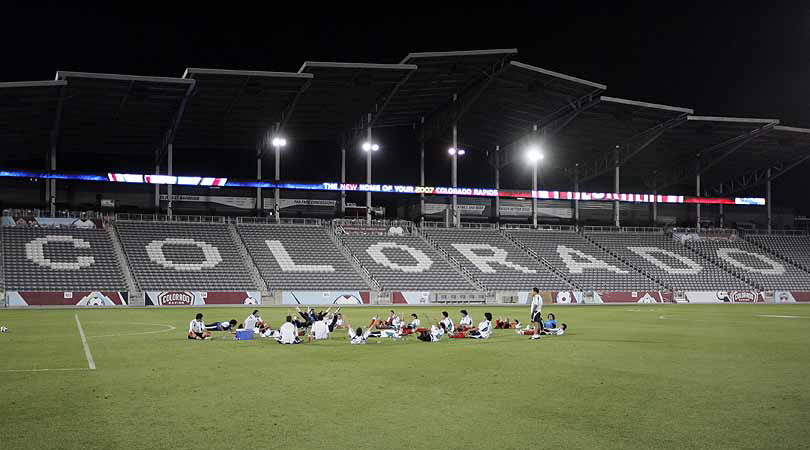
Middelfart Stadium, Denmark
Birthplace of Christian Eriksen, Middelfart is a surname as mundane as Smith back in Scandinavia, but naturally appeals to those of us simple-minded enough to find the Wankdorf Stadium amusing; there was once a reputed Danish banker called Fanny Middelfart working in London, who had to run the gauntlet of sniggering co-workers. They’d no doubt have a field day with the fact that Middelfart FC, from the town of Middelfart, play at the Middelfart Stadium in the Danish second division. Children!
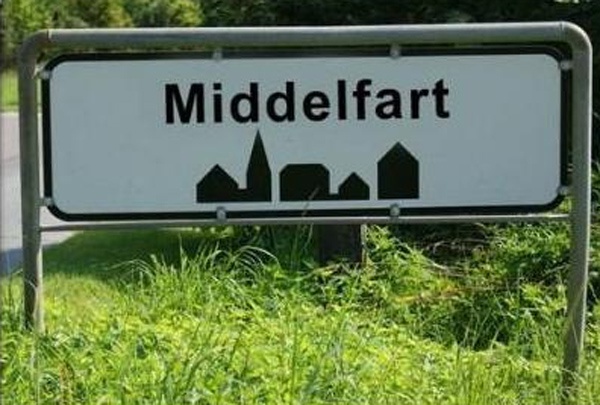
Cheaper Insurance Direct Stadium, Dumbarton
Scotland’s fourth-oldest club has got a lovely home next door to Dumbarton Castle, which is situated on a 204ft volcanic rock plug and dates back to before the Iron Age.
Fans of The Sons have had to endure a raft of name changes, though, including the ‘Strathclyde Homes stadium’, ‘Dumbarton football stadium’, ‘Dumbarton football stadium sponsored by DL Cameron’, ‘BetButler stadium’, and now – worst of all – the ‘Cheaper Insurance Direct’.
Sensibly and stoically, locals just call it ‘The Rock’, but the side is soon to build another bowl, out of town, with the current location being turned into housing. Watch this space for their next trick.
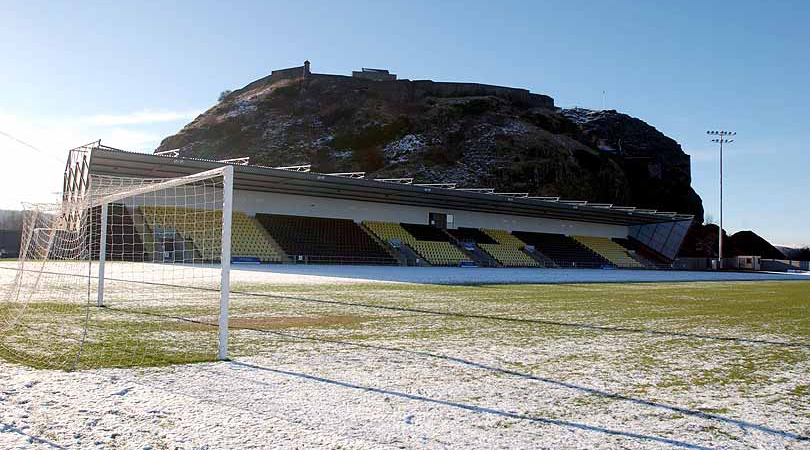
Gay Meadow, Shrewsbury
Let’s keep homophobia out of football here: Shrewsbury’s old home was indeed built on a pretty former meadow, where fairs and carnivals brought forth gaiety in the old sense of the word – and eventually led to the least-threatening sounding football ground moniker in England.
Gay Meadow was a beautifully picturesque traditional stadium, where one could wistfully watch a bloke in a coracle fishing wayward shots out of the river Severn. But modernity eventually caught up with the Shrews, who in 2007 moved to the out-of-town (and grammatically displeasing) Greenhous Meadow. A shame.
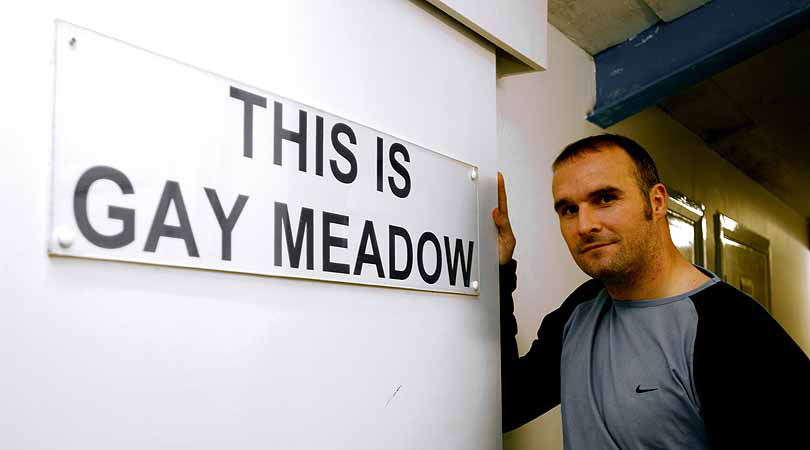
Hunky Dorys Park, Drogheda United
Once thought of as the Manchester City of the Irish League – thanks to a cash-splashing spree that helped them win the league in 2007 – the Drogs found themselves in administration a year later (it’s called ‘examinership’ over the Irish Sea) and went both bankrupt and part-time. The club was saved, but had to swallow the indignity of their far-from-hunky-dory situation leading them to rename United Park after a crisp manufacturer of that name – Ireland’s no.1 maker of crinkle cut, apparently. Difficult to stomach.
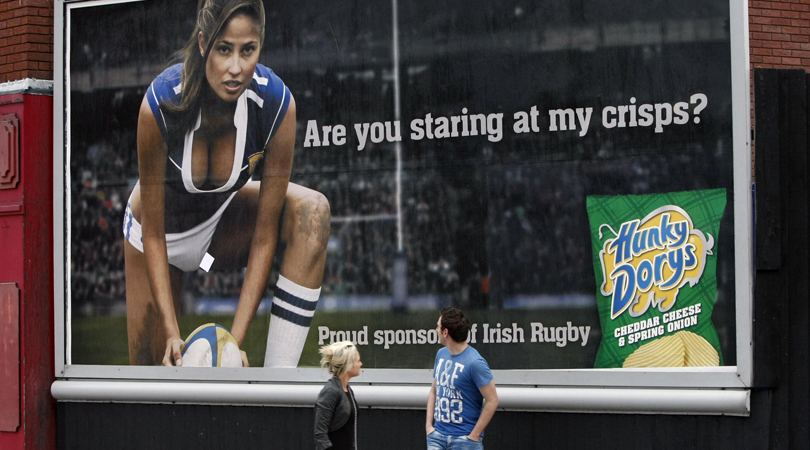
#FFT100STADIUMS The 100 Best Stadiums in the World: list and features here
Nick Moore is a freelance journalist based on the Isle of Skye, Scotland. He wrote his first FourFourTwo feature in 2001 about Gerard Houllier's cup-treble-winning Liverpool side, and has continued to ink his witty words for the mag ever since. Nick has produced FFT's 'Ask A Silly Question' interview for 16 years, once getting Peter Crouch to confess that he dreams about being a dwarf.

